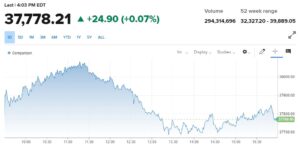Dear Valued Clients and Friends –
It is somewhat of a repeat of yesterday’s market action, with a positive morning failing to hold momentum and falling off into the close in more consolidation in markets around rates. We did eke out a small gain on the Dow, but the S&P 500 closed slightly lower for the fifth session in a row. The 2-YR Treasury is back to YTD highs at just under 5%, and the 10-YR was up 4 bps today to 4.63%.
For what was on the docket today in the economic calendar, mostly good news. Jobless claims, existing home sales and manufacturing data were all modestly ahead of expectations, but it just wasn’t enough to keep the momentum on the day. There isn’t a lot of economic news for the remainder of this week, and most eyes will be on the PCE figures out next Friday.
|
Subscribe on |
Market Action

*CNBC, DJIA, April 18th, 2024
Dow: +24 (+.07%)
S&P: -.22%
Nasdaq: -.52%
10-Year Treasury Yield: 4.63% (+4 basis points)
Top-performing sector: Communication Services (+.66%)
Bottom-performing sector: Information Technology (-.90%)
WTI Crude Oil: $82.12/barrel (-.04%)
Key Economic Points of the Day
- Initial jobless claims came in right in line (and where they have been for months) at 212K vs 215K expected, and existing claims were also inline.
- We had a big beat on the Philadelphia manufacturing index at 15.5 when a -.5 was expected, in again, more strength percolating in manufacturing around the country. Inside the numbers, the prices paid component did jump to the most in several months, so this was taken as bittersweet in markets.
- Existing home sales were better than expected for the month, and prices were up for a ninth month on a year-over-year basis. Inventories were up 4.7% on the month, which while good to see some semblance of thawing in an otherwise frozen home activity market, we are still lower year over year by 14.7%.
- Mortgage rates have crossed back into the 7s again. Although mortgage applications to purchase a home rose 5% from the week prior, they were still 10% lower than the same week last year.
Ask Brian
| “I’m really curious as to what your take is on this idea that higher rates are generating so much interest income (spendable cash) that it currently overwhelms the economic dampening effects of higher interest rates on households with a lot of rate-sensitive debt. Thank you ” -Chris T. |
| Yes, higher interest rates do increase interest income and benefit savers, and vice versa, and conversely have a negative effect on borrowers on the interest expense side.
The part, though, that I would differ from the vantage point of the article you sent is that higher interest rates have derivative effects within the economy that far outweigh any benefit on added interest income. What new small businesses didn’t start, what leveraged buyouts did not take place, and what other investment-related activities failed to happen during the time when rates were higher, and these transactions failed to “pencil”? The longer-term effects of that I believe are more damaging than the short-term benefits to a smaller investor base with a higher interest income. The point on the total debt outstanding being now at 35T versus a lower number in past rate tightening cycles that is causing such an increase in the interest income to savers and purportedly helping the economy is intuitive. However, remember who the largest holder of that debt is receiving those higher interest payments – The US Government. The Fed’s balance sheet of $7.5T (down from over $9T in QT) matters, too, as the interest paid is not spent on the economy. Also, the wealthier person who has enough savings to notice an increase in interest income from savings rates being higher has a lower propensity to spend more than someone less wealthy must spend less. All this to say, I would take the other side to the author you were kind enough to share with me. Thanks for your question. |
On Deck
- Tomorrow, we’ll have Dividend Cafe in your inboxes on an otherwise quiet day in the economic calendar.
- Next week we have a read on PCE again on Friday.
Send questions any time, have a great evening and if I don’t speak to you a nice weekend too!
With regards,
Brian T. Szytel
Co-CIO, Senior Managing Director, Partner
bszytel@thebahnsengroup.com
The Bahnsen Group
www.thebahnsengroup.com
The DC Today features research from S&P, Baird, Barclays, Goldman Sachs, and the IRN research platform of FactSet.


